用英语五种不同的方式打招呼如
- 格式:doc
- 大小:20.00 KB
- 文档页数:4
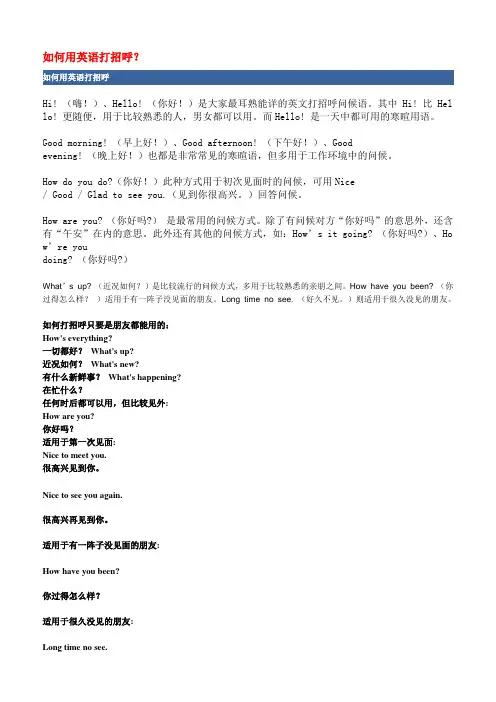
如何用英语打招呼?Hi! (嗨!)、Hello! (你好!)是大家最耳熟能详的英文打招呼问候语。
其中 Hi! 比 Hel lo! 更随便,用于比较熟悉的人,男女都可以用。
而Hello! 是一天中都可用的寒暄用语。
Good morning! (早上好!)、Good afternoon! (下午好!)、Goodevening! (晚上好!)也都是非常常见的寒暄语,但多用于工作环境中的问候。
How do you do?(你好!)此种方式用于初次见面时的问候,可用Nice/ Good / Glad to see you.(见到你很高兴。
)回答问候。
How are you? (你好吗?)是最常用的问候方式。
除了有问候对方“你好吗”的意思外,还含有“午安”在内的意思。
此外还有其他的问候方式,如:How’s it going? (你好吗?)、Ho w’re youdoing? (你好吗?)What’s up? (近况如何?)是比较流行的问候方式,多用于比较熟悉的亲朋之间。
How have you been? (你过得怎么样?)适用于有一阵子没见面的朋友。
Long time no see. (好久不见。
)则适用于很久没见的朋友。
如何打招呼只要是朋友都能用的:How's everything?一切都好?What's up?近况如何?What's new?有什么新鲜事?What's happening?在忙什么?任何时后都可以用,但比较见外:How are you?你好吗?适用于第一次见面:Nice to meet you.很高兴见到你。
Nice to see you again.很高兴再见到你。
适用于有一阵子没见面的朋友:How have you been?你过得怎么样?适用于很久没见的朋友:Long time no see.好久不见只要熟记以下的规则, 来美国和老美打招呼绝不成问题.1.Hello, David!答:Hey, James!2.How are you doing?答:Good! (Pretty good)I am great.3.How are you?Howdy?美国的店员在你结帐的时候都会问这一句, 所以要有心里准备, 只要答声good 就好, 不用再反问.答:I am Fine.I am all right.I am doing good.I am wonderful.Not bad.Well, a little bit tired.礼貌上, 你答完之后, 要再反问: How are you doing?4.What's up?有没有什么事啊?答:Not much!Nothing much!Nothing special没什么5.How is everything going?How is going?How have you been?第二句是第一句的简称, 如在路上遇到, 匆匆走过, 就说第二句就好了!答:Not much.Tired.Good!你当然也可以回答其它的, 如 Busy, 但 Not much 或 Tired 比较常听老美说.6.Happy weekend?星期一见面时可以问这一句.答:I had homework on my head!我满脑子都是功课! (这句可视情况回答)7.How was your trip?How was your flight?How was your party?如果知道别人昨天做了什么事, 可以关心一下, 记得这个句型,How was your xxx ? 很有用. 不要划蛇添足!答:Well, That's good.Well, That's ok.Well, That's all right.Well 是发语词, 没什么意思, 但常用. 如果想继续跟对方聊下去, 可以把经过讲给对方听, 不然这样讲就够了编按: How are you doing 是最常用的, How are you 次之, Howdy 则是简称!。
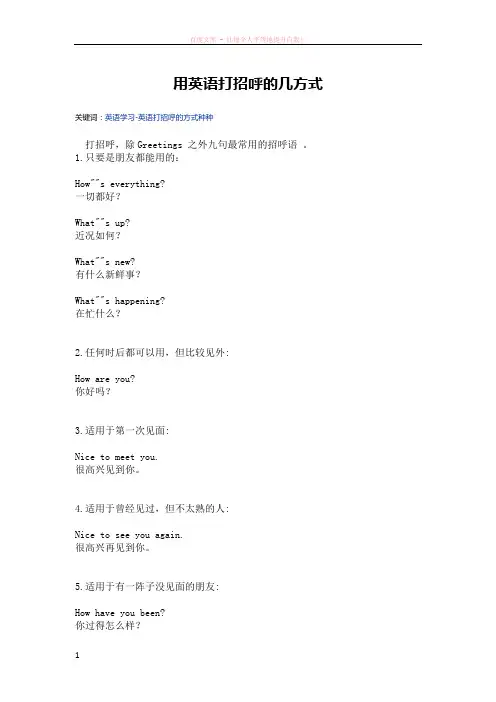
用英语打招呼的几方式关键词:英语学习-英语打招呼的方式种种打招呼,除Greetings 之外九句最常用的招呼语。
1.只要是朋友都能用的:How""s everything?一切都好?What""s up?近况如何?What""s new?有什么新鲜事?What""s happening?在忙什么?2.任何时后都可以用,但比较见外:How are you?你好吗?3.适用于第一次见面:Nice to meet you.很高兴见到你。
4.适用于曾经见过,但不太熟的人:Nice to see you again.很高兴再见到你。
5.适用于有一阵子没见面的朋友:How have you been?你过得怎么样?6.适用于很久没见的朋友:Long time no see.好久不见。
Re:九种英语打招呼的方式addition:Tenth: Hi! (for:lovely girl)Eleventh: Hey! (forld friends)Twelveth: Hello! (for:Americans)Thirteenth: How do you do! (for:strangers) Fourteenth: You bad boy! (for:naughty boy) Fifteenth: How are you going? (for:business man) Sixteenth: Have got a meal yet? (for:Chinese people)。
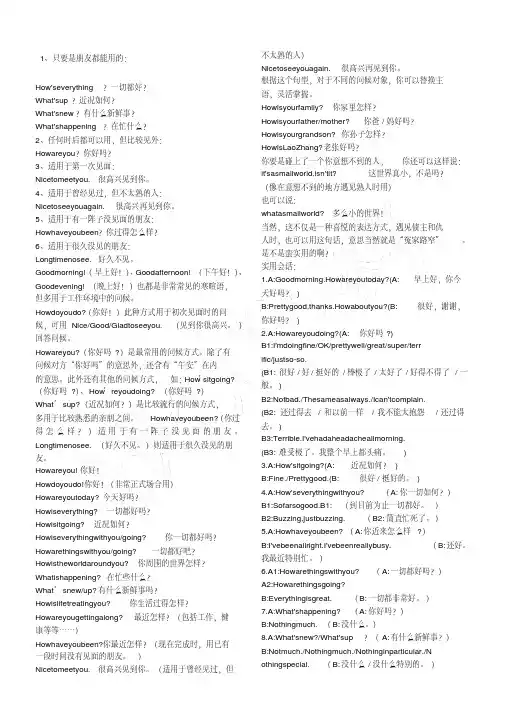
1、只要是朋友都能用的:How'severything?一切都好?What'sup?近况如何?What'snew?有什么新鲜事?What'shappening?在忙什么?2、任何时后都可以用,但比较见外:Howareyou?你好吗?3、适用于第一次见面:Nicetomeetyou.很高兴见到你。
4、适用于曾经见过,但不太熟的人:Nicetoseeyouagain.很高兴再见到你。
5、适用于有一阵子没见面的朋友:Howhaveyoubeen?你过得怎么样?6、适用于很久没见的朋友:Longtimenosee.好久不见。
Goodmorning!(早上好!)、Goodafternoon!(下午好!)、Goodevening!(晚上好!)也都是非常常见的寒暄语,但多用于工作环境中的问候。
Howdoyoudo?(你好!)此种方式用于初次见面时的问候,可用Nice/Good/Gladtoseeyou.(见到你很高兴。
)回答问候。
Howareyou?(你好吗?)是最常用的问候方式。
除了有问候对方“你好吗”的意思外,还含有“午安”在内的意思。
此外还有其他的问候方式,如:How’sitgoing?(你好吗?)、How’reyoudoing?(你好吗?)What’sup?(近况如何?)是比较流行的问候方式,多用于比较熟悉的亲朋之间。
Howhaveyoubeen?(你过得怎么样?)适用于有一阵子没见面的朋友。
Longtimenosee.(好久不见。
)则适用于很久没见的朋友。
Howareyou!你好!Howdoyoudo!你好!(非常正式场合用)Howareyoutoday?今天好吗?Howiseverything?一切都好吗?Howisitgoing?近况如何?Howiseverythingwithyou/going?你一切都好吗?Howarethingswithyou/going?一切都好吧?Howistheworldaroundyou?你周围的世界怎样?Whatishappening?在忙些什么?What’snew/up?有什么新鲜事吗?Howislifetreatingyou?你生活过得怎样?Howareyougettingalong?最近怎样?(包括工作,健康等等……)Howhaveyoubeen?你最近怎样?(现在完成时,用已有一段时间没有见面的朋友。
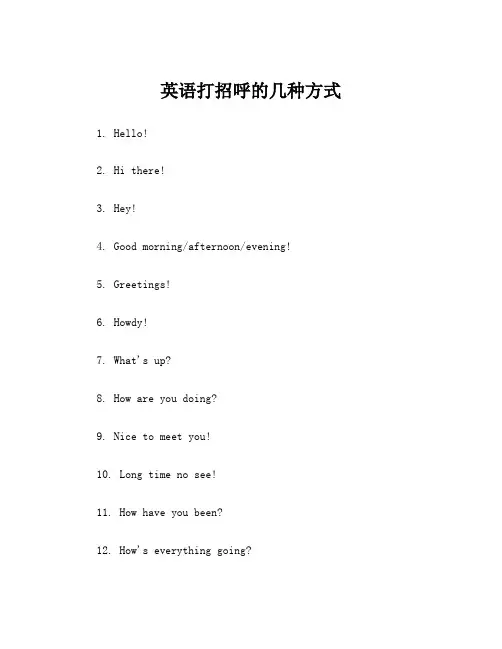
英语打招呼的几种方式1. Hello!2. Hi there!3. Hey!4. Good morning/afternoon/evening!5. Greetings!6. Howdy!7. What's up?8. How are you doing?9. Nice to meet you!10. Long time no see!11. How have you been?12. How's everything going?13. What's new?14. How's your day/week going?15. How's life treating you?16. How are things on your end?17. What have you been up to lately?18. How's your family?19. How are the kids doing?20. It's great to see you!21. How are you feeling today?22. Good to see you again!23. What's happening?24. How's your day treating you?25. How's work/school going?26. What's the latest news?27. Are you keeping busy?28. Any exciting plans for the weekend?29. Are you enjoying the weather?30. How's the weather treating you today?31. What brings you here today?32. Is everything alright?33. How's your health?34. Did you have a good weekend?35. Are you ready for the holidays?36. How was your vacation?37. What's your schedule like these days?38. Any updates on your project?39. How's your new job treating you?40. What have you been working on lately?41. How are your hobbies going?42. How was the party/event?43. Any interesting movies/books you've come across lately?44. How's your pet doing?45. What are your plans for the evening?46. Are you enjoying the city/experience so far?47. How was your trip?48. What's on your agenda for today?49. Have you tried any new restaurants/cafes?50. How's the renovation/repairs going?51. Any good recommendations for entertainment?52. How's your workout routine going?53. Are you excited about any upcoming events?54. How's your sleep doing these days?55. Have you discovered any new music/artists lately?56. How's the commute to work/school?57. Any highlights from your day/week?58. How's the progress on your goals/ambitions?59. What's the best thing that happened to you recently?60. Is there anything you need help with?61. How's your favorite sports team doing?62. How's your garden/plants doing?63. Any interesting discoveries or learnings lately?64. How's your language learning journey going?65. What's your favorite TV show/movie these days?66. How's your volunteer work going?67. Is there anything exciting happening in your community?68. Any new exciting recipes you've tried recently?69. How's your photography/artwork progressing?70. How's your shopping experience been lately?71. Do you have any fun weekend plans?72. What's your favorite way to relax/unwind?73. How's your meditation/yoga routine going?74. How's your family doing during these times?75. Any interesting virtual events or webinars you've attended?76. How's your productivity level these days?77. Any new skills or hobbies you're pursuing?78. How's your reading challenge going?79. Have you had any interesting conversations lately?80. How's your favorite sports team doing this season?81. Any exciting travel plans on the horizon?82. How is the situation in your area/country?83. How's your favorite book series progressing?84. How's the progress on your home improvement project?85. Any interesting podcasts you've been listening to?86. How's your favorite TV series season progressing?87. Are you planning any surprises for your loved ones?88. How's your creativity flowing these days?89. How are you staying motivated during these times?90. How's your financial planning going?91. Any new interesting gadgets or technology you've come across?92. How are your New Year's resolutions holding up?93. How's your work-life balance these days?94. Are you planning any trips to explore the outdoors?95. How's your balance between relaxation and productivity?96. How's your favorite online course progressing?97. Any interesting adventures or discoveries lately?98. How are you coping with the current challenges?99. How's your favorite sports team's performance?100. How's your mindfulness practice going?。
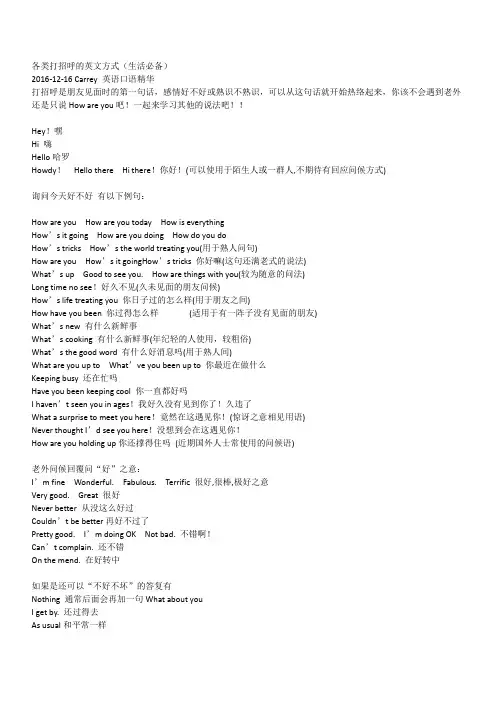
各类打招呼的英文方式(生活必备)2016-12-16 Carrey 英语口语精华打招呼是朋友见面时的第一句话,感情好不好或熟识不熟识,可以从这句话就开始热络起来,你该不会遇到老外还是只说How are you吧!一起来学习其他的说法吧!!Hey!嘿Hi 嗨Hello哈罗Howdy!Hello there Hi there!你好!(可以使用于陌生人或一群人,不期待有回应问候方式)询问今天好不好有以下例句:How are you How are you today How is everythingHow’s it going How are you doing How do you doHow’s tricks How’s the world treating you(用于熟人问句)How are you How’s it goingHow’s tricks 你好嘛(这句还满老式的说法)What’s up Good to see you. How are things with you(较为随意的问法)Long time no see!好久不见(久未见面的朋友问候)How’s life treating you 你日子过的怎么样(用于朋友之间)How have you been 你过得怎么样(适用于有一阵子没有见面的朋友)What’s new 有什么新鲜事What’s cooking 有什么新鲜事(年纪轻的人使用,较粗俗)What’s the good word 有什么好消息吗(用于熟人间)What are you up to What’ve you been up to 你最近在做什么Keeping busy 还在忙吗Have you been keeping cool 你一直都好吗I haven’t seen you in ages!我好久没有见到你了!久违了What a surprise to meet you here!竟然在这遇见你!(惊讶之意相见用语)Never thought I’d see you here!没想到会在这遇见你!How are you holding up你还撑得住吗(近期国外人士常使用的问候语)老外问候回覆问“好”之意:I’m fine Wonderful. Fabulous. Terrific 很好,很棒,极好之意Very good. Great 很好Never better 从没这么好过Couldn’t be better再好不过了Pretty good. I’m doing OK Not bad. 不错啊!Can’t complain. 还不错On the mend. 在好转中如果是还可以“不好不坏”的答复有Nothing 通常后面会再加一句What about youI get by. 还过得去As usual和平常一样Not much 没什么特别的Fair to middling 还可以It’s ok It’s all right It's passable. It Could be worse. I'm not complaining. 还好啦Nothing special new 没有什么特别新鲜事Same shit,different day 不同日子,同样调子(这句带有比较粗俗不礼貌的说法) Same old crap 老样子(这句带有比较粗俗不礼貌的说法)如果是“不好”的答复有Not so good. Lousy Awful. very bad. 不好I feel terrible 我感觉糟透了It sucks!糟糕透了。
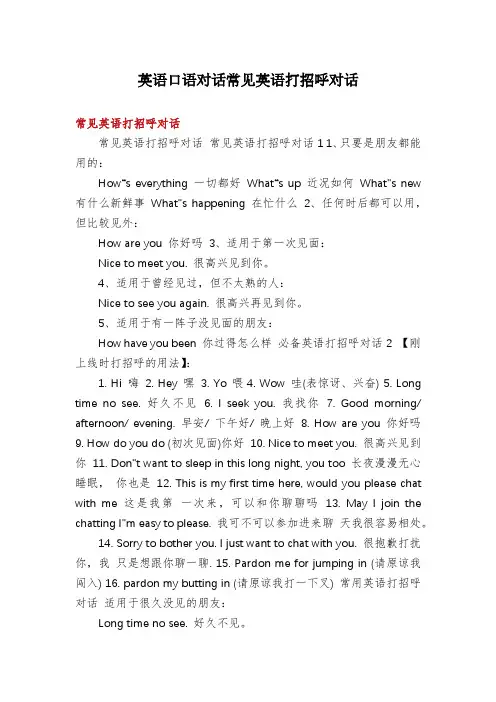
英语口语对话常见英语打招呼对话常见英语打招呼对话常见英语打招呼对话常见英语打招呼对话1 1、只要是朋友都能用的:How“s everything 一切都好What“s up 近况如何What"s new 有什么新鲜事What"s happening 在忙什么2、任何时后都可以用,但比较见外:How are you 你好吗3、适用于第一次见面:Nice to meet you. 很高兴见到你。
4、适用于曾经见过,但不太熟的人:Nice to see you again. 很高兴再见到你。
5、适用于有一阵子没见面的朋友:How have you been 你过得怎么样必备英语打招呼对话2 【刚上线时打招呼的用法】:1. Hi 嗨2. Hey 嘿3. Yo 喂4. Wow 哇(表惊讶、兴奋)5. Long time no see. 好久不见6. I seek you. 我找你7. Good morning/ afternoon/ evening. 早安/ 下午好/ 晚上好8. How are you 你好吗9. How do you do (初次见面)你好10. Nice to meet you. 很高兴见到你11. Don"t want to sleep in this long night, you too 长夜漫漫无心睡眠,你也是12. This is my first time here, would you please chat with me 这是我第一次来,可以和你聊聊吗13. May I join the chatting I"m easy to please. 我可不可以参加进来聊天我很容易相处。
14. Sorry to bother you. I just want to chat with you. 很抱歉打扰你,我只是想跟你聊一聊. 15. Pardon me for jumping in (请原谅我闯入) 16. pardon my butting in (请原谅我打一下叉) 常用英语打招呼对话适用于很久没见的朋友:Long time no see. 好久不见。
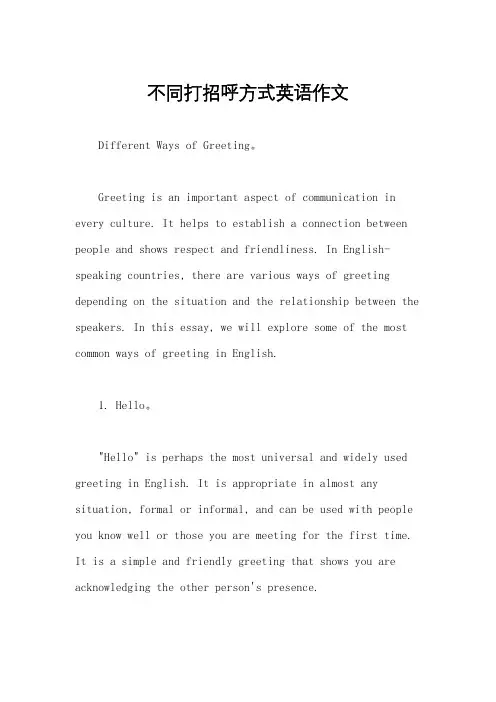
不同打招呼方式英语作文Different Ways of Greeting。
Greeting is an important aspect of communication in every culture. It helps to establish a connection between people and shows respect and friendliness. In English-speaking countries, there are various ways of greeting depending on the situation and the relationship between the speakers. In this essay, we will explore some of the most common ways of greeting in English.1. Hello。
"Hello" is perhaps the most universal and widely used greeting in English. It is appropriate in almost any situation, formal or informal, and can be used with people you know well or those you are meeting for the first time. It is a simple and friendly greeting that shows you are acknowledging the other person's presence.Example: "Hello, how are you today?"2. Hi。
"Hi" is a more casual and informal version of "hello." It is often used among friends, family, and colleagues, but may not be suitable in more formal situations. It is a friendly and relaxed greeting that shows you are comfortable with the other person.Example: "Hi, what's up?"3. Good morning/afternoon/evening。
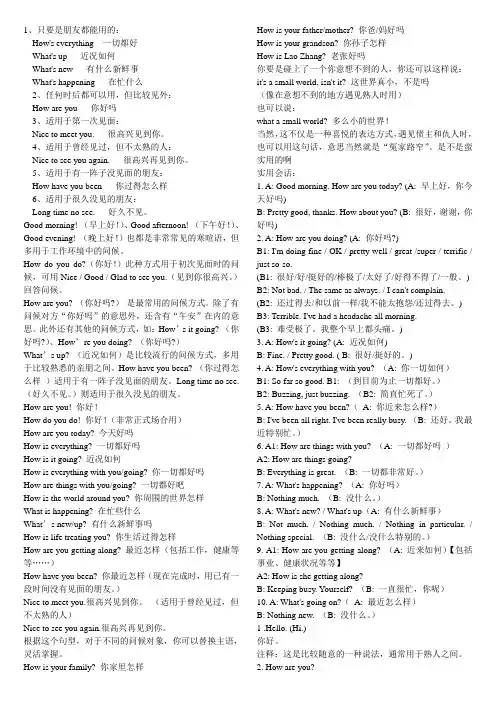
1、只要是朋友都能用的:How's everything 一切都好What's up 近况如何What's new 有什么新鲜事What's happening 在忙什么2、任何时后都可以用,但比较见外:How are you 你好吗3、适用于第一次见面:Nice to meet you. 很高兴见到你。
4、适用于曾经见过,但不太熟的人:Nice to see you again. 很高兴再见到你。
5、适用于有一阵子没见面的朋友:How have you been 你过得怎么样6、适用于很久没见的朋友:Long time no see. 好久不见。
Good morning! (早上好!)、Good afternoon! (下午好!)、Good evening! (晚上好!)也都是非常常见的寒暄语,但多用于工作环境中的问候。
How do you do?(你好!)此种方式用于初次见面时的问候,可用Nice / Good / Glad to see you.(见到你很高兴。
)回答问候。
How are you? (你好吗?)是最常用的问候方式。
除了有问候对方“你好吗”的意思外,还含有“午安”在内的意思。
此外还有其他的问候方式,如:How’s it going? (你好吗?)、How’re you doing? (你好吗?)What’s up? (近况如何)是比较流行的问候方式,多用于比较熟悉的亲朋之间。
How have you been? (你过得怎么样)适用于有一阵子没见面的朋友。
Long time no see. (好久不见。
)则适用于很久没见的朋友。
How are you! 你好!How do you do! 你好!(非常正式场合用)How are you today? 今天好吗How is everything? 一切都好吗How is it going? 近况如何How is everything with you/going? 你一切都好吗How are things with you/going? 一切都好吧How is the world around you? 你周围的世界怎样What is happening? 在忙些什么What’s new/up? 有什么新鲜事吗How is life treating you? 你生活过得怎样How are you getting along? 最近怎样(包括工作,健康等等……)How have you been? 你最近怎样(现在完成时,用已有一段时间没有见面的朋友。
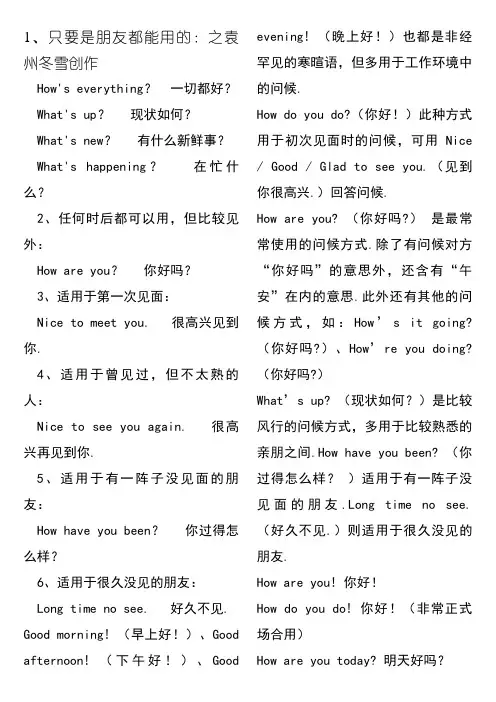
1、只要是朋友都能用的:之袁州冬雪创作How's everything?一切都好? What's up?现状如何?What's new?有什么新鲜事?What's happening?在忙什么?2、任何时后都可以用,但比较见外:How are you?你好吗?3、适用于第一次见面:Nice to meet you. 很高兴见到你.4、适用于曾见过,但不太熟的人:Nice to see you again. 很高兴再见到你.5、适用于有一阵子没见面的朋友:How have you been?你过得怎么样?6、适用于很久没见的朋友:Long time no see. 好久不见. Good morning! (早上好!)、Good afternoon! (下午好!)、Good evening! (晚上好!)也都是非经罕见的寒暄语,但多用于工作环境中的问候.How do you do?(你好!)此种方式用于初次见面时的问候,可用Nice / Good / Glad to see you.(见到你很高兴.)回答问候.How are you? (你好吗?)是最常常使用的问候方式.除了有问候对方“你好吗”的意思外,还含有“午安”在内的意思.此外还有其他的问候方式,如:How’s it going? (你好吗?)、How’re you doing? (你好吗?)What’s up? (现状如何?)是比较风行的问候方式,多用于比较熟悉的亲朋之间.How have you been? (你过得怎么样?)适用于有一阵子没见面的朋友.Long time no see. (好久不见.)则适用于很久没见的朋友.How are you! 你好!How do you do! 你好!(非常正式场合用)How are you today? 明天好吗?How is everything? 一切都好吗?How is it going? 现状如何?How is everything with you/going? 你一切都好吗?How are things with you/going? 一切都好吧?How is the world around you? 你周围的世界怎样?What is happening? 在忙些什么?What’s new/up? 有什么新鲜事吗?How is life treating you? 你生活过得怎样?How are you getting along? 最近怎样?(包含工作,健康等等……)How have you been? 你最近怎样?(现在完成时,用已有一段时间没有见面的朋友.)Nice to meet you.很高兴见到你. (适用于曾见过,但不太熟的人)Nice to see you again.很高兴再见到你.根据这个句型,对于分歧的问候对象,你可以替换主语,矫捷掌握.How is your family? 你家里怎样?How is your father/mother? 你爸/妈好吗?How is your grandson? 你孙子怎样?How is Lao Zhang? 老张好吗?你要是碰上了一个你意想不到的人,你还可以这样说:it's a small world, isn't it? 这世界真小,不是吗?(像在意想不到的地方遇见熟人时用)也可以说:what a small world? 多么小的世界!当然,这不但是一种喜悦的表达方式,遇见债主和仇人时,也可以用这句话,意思当然就是“冤家路窄”.是不是蛮实用的啊?实用会话:1. A: Good morning. How are you today? (A: 早上好,你明天好吗?) B: Pretty good, thanks. How about you? (B: 很好,谢谢,你好吗?)2. A: How are you doing? (A: 你好吗?)B1: I'm doing fine / OK / pretty well / great /super / terrific / just so-so.(B1: 很好/好/挺好的/棒极了/太好了/好得不得了/一般.)B2: Not bad. / The same as always. / I can't complain.(B2: 还过得去/和以前一样/我不克不及太抱怨/还过得去.)B3: Terrible. I've had a headache all morning.(B3: 难熬难过极了.我整个早上都头痛.)3. A: How's it going? (A: 现状如何?)B: Fine. / Pretty good. ( B: 很好/挺好的.)4. A: How's everything with you? (A: 你一切如何?)B1: So far so good. B1: (到今朝为止一切都好.)B2: Buzzing, just buzzing. (B2: 简直忙死了.)5. A: How have you been?( A: 你迩来怎么样?)B: I've been all right. I've been really busy. (B: 还好.我最近特别忙.)6. A1: How are things with you? (A: 一切都好吗?)A2: How are things going?B: Everything is great. (B: 一切都非常好.)7. A: What's happening? (A: 你好吗?)B: Nothing much. (B: 没什么.)8. A: What's new? / What's up?(A: 有什么新鲜事?)B: Not much. / Nothing much. / Nothing in particular. / Nothing special. (B: 没什么/没什么特此外.)9. A1: How are you getting along? (A: 迩来如何?)【包含事业、健康状况等等】A2: How is she getting along?B: Keeping busy. Yourself? (B: 一直很忙,你呢?)10. A: What's going on?( A: 最近怎么样?)B: Nothing new. (B: 没什么.)1 .Hello. (Hi.)你好.注释:这是比较随意的一种说法,通常常使用于熟人之间.2. How are you?你好.注释:较正式的一种说法.3. Good morning(afternoon/evening).早上好.(下午好/晚上好)4. Very well, thank you ,and you? 我很好,谢谢,你呢?5. Fine ,thanks.我也很好,谢谢.6.How are things with you?一切可好?7.Not bad. Thank you.不坏,谢谢.8. How is Helen?海伦怎么样?9.She’s very well,thank you.她很好,谢谢.30个经典赞美句子1.you look great today.(你明天看上去很棒.)【天天都可以用!】2. you did a good job. (你干得非常好.)【国际最通用的表扬!】3. we’re so proud of you.(我们十分为你自豪.)【最高级的表扬!】4. i’m very pleased with your work.(我对你的工作非常称心.)【正式、真诚的赞扬!】5. this is really a nice place.(这真是个好地方!)【随口就说、但效果很好的表扬!】6. you’re looking sharp!(你看上去真精力/真棒/真漂亮.)【与众分歧的表扬!】7. you always know the right thing to say.= 8. you’re very eloquent.(你总是说话得体.)【高条理的表扬!】9. nice going! = you did a good job.(干得好!)【极其地道的表扬!】10. the food is delicious.(好吃!)【最普通、但非常重要的表扬!】11. everything tastes great.(每样东西都很甘旨!)12. your son/daughter is so cute.(你的孩子很心爱.)【外国人相对喜欢听的表扬!】13. what an adorable baby!(多么心爱的孩子.)【只管大胆用!】14. i admire your work. = 15. i respect your work.(我对你的工作暗示敬意.)【世界通用!】16. you’ve got a great personality.(你的个性很好.)【一个非常平安的表扬!】17. you have a good sense of humor.(你真幽默.)【美国人极其喜欢的表扬!】18. your chinese is really surprising.(你的中文使人诧异.)【相对和其他人纷歧样的表扬!】19. your english is incredible.(我真不敢相信你的英语.)【用了六星级形容词!】20. you have a very successful business.(你的事业很成功.)【现代人非常喜欢听!】21. you’re very professional.(你非常专业.)【专业化的表扬!】22. your company is very impressive.(你的公司给我留下深刻印象.)23. you’re so smart.(你非常聪明.)24. i envy you very much.(我非常羡慕你.)25. your wife is very charming.(你的妻子很有魅力!)26. you two make a lovely couple.(你们真是天生的一对!)27. you’re really talented.(你很有天赋.)28. you look nice in that color.(你穿那种颜色很好看.)29. you have a good taste.(你很有品位.)30. you look like a million dollars. = you lookoutstanding.=you look like a movie star.(你看上去帅呆了.)Meet my friend Jay.来认识一下我的朋友杰.I'd like you to meet Kate.我想你来认识一下凯特.Jennifer,this is Tim.詹妮弗,这是蒂姆.Nice to meet you.很高兴见到你.I don't think we've met yet.My name is Anne.我们好像还没见过面.我的名字叫娜.Hello,I'm Charle你好,我叫查尔斯Sorry,I didn't catch your name.对不起,我没有听清楚你的名字.You must be William.你一定是威谦吧.I've heard so much about you.你的大名如雷贯耳.Good to meet you.很高兴认识你.What's your name?你叫什么名字?John,Marie.Marie,John.约翰,这是玛丽.玛丽,这是约翰.Happy to know you.认识你很高兴.So,who are you?请问,你是谁?I don't think I've seen you around here.我想我以前在这没见过你.Tell me something about yourself.先容一下你自己吧.So,what's your story?那末,讲讲你的情况好吗?What do you do?你是干哪一行的?Allow me to introduce Mr.Adams to you.请让我先容你认识亚斯先生.May I have the pleasure of introducing Mrs.Butler to you?我先容你认识波特勒夫人好吗?Allow me to introduce myself.I'm Allan Brooks.请允许我先容一下我自己.我叫阿伦.布鲁克斯.It's a pleasure to make your acquaintance. 很荣幸认识你.It's a pleasure to meet you. 很荣幸见到你.I'm delighted to meet you.很高兴认识你.Excuse me,are you Mr.Rodgers? 对不起,你是罗杰斯先生吗?(责任编辑:stephen)。
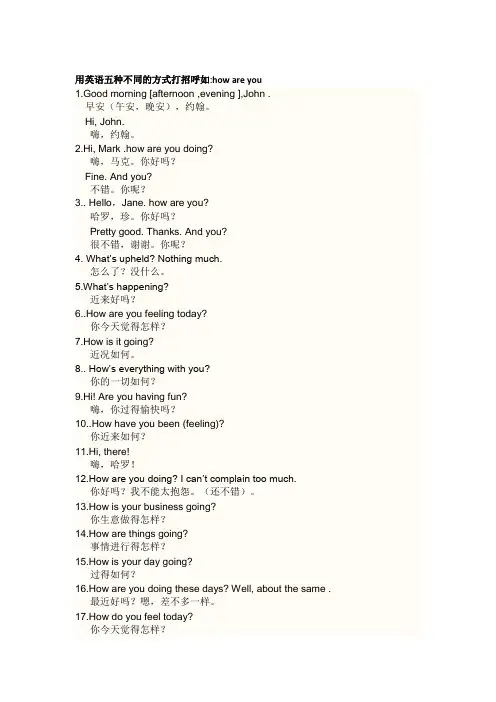
用英语五种不同的方式打招呼如:how are you1.Good morning [afternoon ,evening ],John .早安(午安,晚安),约翰。
Hi, John.嗨,约翰。
2.Hi, Mark .how are you doing?嗨,马克。
你好吗?Fine. And you?不错。
你呢?3.. Hello,Jane. how are you?哈罗,珍。
你好吗?Pretty good. Thanks. And you?很不错,谢谢。
你呢?4. What’s upheld? Nothing much.怎么了?没什么。
5.What’s happening?近来好吗?6..How are you feeling today?你今天觉得怎样?7.How is it going?近况如何。
8.. How’s everything with you?你的一切如何?9.Hi! Are you having fun?嗨,你过得愉快吗?10..How have you been (feeling)?你近来如何?11.Hi, there!嗨,哈罗!12.How are you doing? I can’t complain too much.你好吗?我不能太抱怨。
(还不错)。
13.How is your business going?你生意做得怎样?14.How are things going?事情进行得怎样?15.How is your day going?过得如何?16.How are you doing these days? Well, about the same .最近好吗?嗯,差不多一样。
17.How do you feel today?你今天觉得怎样?How are you?是英语中见面最常见的一句话.基本上每个讲英语的人每天都要说NN多遍.但是How are you? 的回答有很多种.1、心情一般时1). Just fine. Thanks. 还好,谢谢。
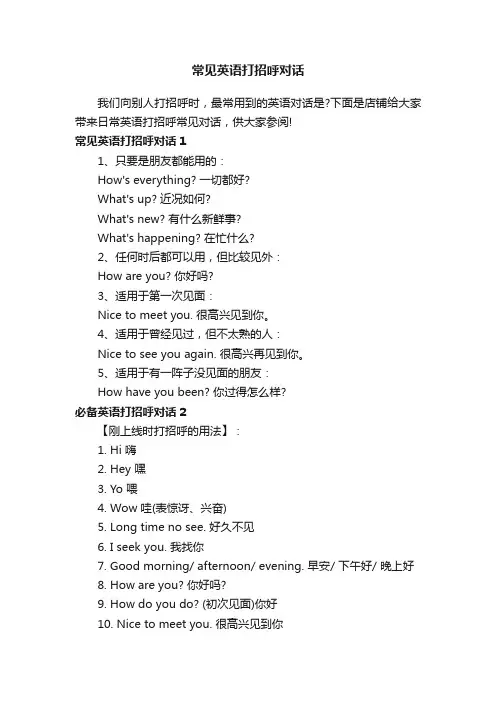
常见英语打招呼对话我们向别人打招呼时,最常用到的英语对话是?下面是店铺给大家带来日常英语打招呼常见对话,供大家参阅!常见英语打招呼对话11、只要是朋友都能用的:How's everything? 一切都好?What's up? 近况如何?What's new? 有什么新鲜事?What's happening? 在忙什么?2、任何时后都可以用,但比较见外:How are you? 你好吗?3、适用于第一次见面:Nice to meet you. 很高兴见到你。
4、适用于曾经见过,但不太熟的人:Nice to see you again. 很高兴再见到你。
5、适用于有一阵子没见面的朋友:How have you been? 你过得怎么样?必备英语打招呼对话2【刚上线时打招呼的用法】:1. Hi 嗨2. Hey 嘿3. Yo 喂4. Wow 哇(表惊讶、兴奋)5. Long time no see. 好久不见6. I seek you. 我找你7. Good morning/ afternoon/ evening. 早安/ 下午好/ 晚上好8. How are you? 你好吗?9. How do you do? (初次见面)你好10. Nice to meet you. 很高兴见到你11. Don't want to sleep in this long night, you too? 长夜漫漫无心睡眠,你也是?12. This is my first time here, would you please chat with me? 这是我第一次来,可以和你聊聊吗?13. May I join the chatting? I'm easy to please. 我可不可以参加进来聊天?我很容易相处。
14. Sorry to bother you. I just want to chat with you. 很抱歉打扰你,我只是想跟你聊一聊.15. Pardon me for jumping in (请原谅我闯入)16. pardon my butting in (请原谅我打一下叉)常用英语打招呼对话适用于很久没见的朋友:Long time no see. 好久不见。
各类打招呼的英⽂⽅式(⽣活必备)公司来了许多新同事和学⽣有的眼熟有的根本不认识每天上班在电梯⼝遇到我就在想要不要打个招呼如果对⽅回应了我该怎么接话?万⼀对⽅压根不认识我那不是好尴尬?据说英⽂⾥有回复的套路还有些问候⽅式可以适⽤于陌⽣⼈或⼀群⼈不期待对⽅有回应的这么好的内容我不能独享分享给⼤家了打招呼是朋友见⾯时的第⼀句话,感情好不好?或熟识不熟识,可以从这句话就开始热络起来,你该不会遇到⽼外还是只说How are you吧!⼀起来学习其他的说法吧!!Hey!嘿 / Hi 嗨 / Hello哈罗Howdy! / Hello there / Hi there!你好!(可以使⽤于陌⽣⼈或⼀群⼈,不期待有回应问候⽅式)询问今天好不好? 有以下例句:How are you? / How are you today? / How is everything? How’s it going? / How are you doing? / How do you do? How’s tricks? / How’s the world treating you?(⽤于熟⼈问句)How are you? / How’s it going?/How’s tricks?你好嘛?(这句还满⽼式的说法)What’s up? / Good to see you. / How are things with you? (较为随意的问法)Long time no see!好久不见(久未见⾯的朋友问候)How’s life treating you?你⽇⼦过的怎么样?(⽤于朋友之间)How have you been?你过得怎么样?(适⽤于有⼀阵⼦没有见⾯的朋友)What’s new?有什么新鲜事?What’s cooking?有什么新鲜事?(年纪轻的⼈使⽤,较粗俗)What’s the good word?有什么好消息吗?(⽤于熟⼈间)What are you up to? / What’ve you been up to?你最近在做什么?Keeping busy?还在忙吗?Have you been keeping cool?你⼀直都好吗?I haven’t seen you in ages!我好久没有见到你了!久违了What a surprise to meet you here!竟然在这遇见你!(惊讶之意相见⽤语)Never thought I’d see you here!没想到会在这遇见你!How are you holding up?你还撑得住吗?(近期国外⼈⼠常使⽤的问候语)⽼外问候回覆问“好”之意:I’m fine / Wonderful. / Fabulous. / Terrific 很好,很棒,极好之意Very good. / Great很好Never better从没这么好过Couldn’t be better再好不过了Pretty good. / I’m doing OK / Not bad.不错啊!Can’t complain.还不错On the mend.在好转中如果是还可以“不好不坏”的回覆有Nothing 通常后⾯会再加⼀句What about you?I get by.还过得去As usual和平常⼀样Not much没什么特别的Fair to middling还可以It’s ok / It’s all right / It's passable. / It Could be worse. / I'm not complaining. 还好啦Nothing special / new没有什么特别/新鲜事Same shit,different day不同⽇⼦,同样调⼦(这句带有⽐较粗俗不礼貌的说法)Same old crap⽼样⼦(这句带有⽐较粗俗不礼貌的说法)如果是“不好”的回覆有Not so good. / Lousy / Awful. / very bad. /不好I feel terrible我感觉糟透了It sucks!糟糕透了观点:有⼈说,空虚是别⼈都觉得你过的挺好的,但是你⾃⼰依然感到迷茫和恐慌。
和朋友打招呼的英语一、常见的简单打招呼用语。
1. “Hello”或“Hi”- 这是最基本、最通用的英语打招呼方式。
适用于各种场合,无论是正式还是非正式的,与熟人或者陌生人都可以使用。
例如,在学校走廊遇到同学,简单地说“Hello”或者“Hi”就很自然。
原因是它们简洁明了,容易发音,而且被广泛接受,不会给人过于亲昵或者过于正式的感觉。
2. “Good morning/afternoon/evening”- 根据不同的时间段使用。
“Good morning”用于上午,通常是从早晨到中午12点之前;“Good afternoon”用于中午12点之后到傍晚;“Good evening”用于傍晚到晚上睡觉之前。
这种打招呼方式比较正式和礼貌。
例如在工作场合,早上见到同事可以说“Good morning”。
这是因为它明确了时间,带有一定的礼仪性,体现出对对方的尊重。
二、比较亲昵、随意的打招呼用语(适用于朋友之间)1. “Hey, buddy!”或“Hey, pal!”- “buddy”和“pal”都有“伙伴”“朋友”的意思。
这种打招呼方式很亲昵、轻松,适用于关系比较好的朋友之间。
在和好朋友一起去看球赛的路上,你可以兴奋地说“Hey, pal! Are you ready for the game?”这样说会让朋友感觉你们之间的关系很亲密,没有距离感。
2. “What's up?”- 这是非常常见的美式口语打招呼方式。
它的字面意思是“发生了什么事?”但实际上更多是一种问候,不需要对方详细回答发生了什么事情。
朋友之间用这个招呼语很自然、随性。
例如,在街头遇到朋友,说一句“What's up?”就开启了轻松的对话氛围。
这是因为它体现了一种关心朋友近况的态度,同时又不需要很严肃的回应。
3. “Long time no see”- 字面意思是“好久不见”。
当你和一段时间没见的朋友相遇时就可以这么说。
这个表达原本是中式英语,但由于使用广泛,已经被英语国家所接受。
英文打招呼用语体会打招呼用语的奥妙所在,做到灵活运用。
1. Good morning:早晨好!【语境】一般用于熟人、朋友或家人之间,比Hello和Hi要正式一些..注意称呼语(MissGao)要放在问候语后面,用逗号隔开.当你在早晨或是上午遇见某人时,若想与他/她打招呼以示问候,可用此语。
例如:A:Good morning, Mr. Brown!B:Good morning, Betty!A:早上好,布朗先生。
B:贝蒂,早上好!A:Morning, Dick!B:Morning, John! How are you?A:Fine, thank you. And you?B:Fine, too, thanks.A:迪克早!B:约翰早!你好吗?A:很好,谢谢。
你呢?B:我也很好,谢谢。
【浅析】Good morning通常是指从凌晨开始到中午12点。
它不但在见面时用也可以在分手时用。
在分手时相当于Good-bye! 一般在熟人之间,只用其名,省去其姓和前面的Mr.和Mrs.等头衔。
适用于比较正式客气的场合,双方都应说Good morning! 例如:A: Good morning, Miss Zhao. 早晨好,赵老师。
B: Good morning, Mr. Wang. 早晨好,王校长。
2. Morning:适用于比较熟悉的朋友之间或比较繁忙的情况下。
3. Hello:你好!喂!是最广泛、最简单的打招呼,显得亲切自然。
【语境】Hello一般可作为熟人、朋友、青年人之间的招呼用语,语气较随便,意为“您好”;此外打电话或路遇熟人也可用.意为“喂”.在表示惊讶或引起对方的注意, 表示问候唤起注意时,有时可用Hi来代替Hello,显得更为随便.意为:喂,你好,看等. 如:【例】A:Hello/ Hi, Han Mei! 你好,韩梅!B:Hello/ Hi, Jim! 你好,吉姆!A:Hello! How are you?B:I'm very well, thank you.A:你好!身体好吗?B:很好,谢谢。
1、只要是朋友都能用的:How's everything?一切都好?What's up?近况如何?What's new?有什么新鲜事?What's happening?在忙什么?2、任何时后都可以用,但比较见外:How are you?你好吗?3、适用于第一次见面:Nice to meet you. 很高兴见到你。
4、适用于曾经见过,但不太熟的人:Nice to see you again. 很高兴再见到你。
5、适用于有一阵子没见面的朋友:How have you been?你过得怎么样?6、适用于很久没见的朋友:Long time no see. 好久不见。
Good morning! (早上好!)、Good afternoon! (下午好!)、Good evening! (晚上好!)也都是非常常见的寒暄语,但多用于工作环境中的问候。
How do you do?(你好!)此种方式用于初次见面时的问候,可用Nice / Good / Glad to see you.(见到你很高兴。
)回答问候。
How are you? (你好吗?)是最常用的问候方式。
除了有问候对方“你好吗”的意思外,还含有“午安”在内的意思。
此外还有其他的问候方式,如:How’s it going? (你好吗?)、How’re you doing? (你好吗?)What’s up? (近况如何?)是比较流行的问候方式,多用于比较熟悉的亲朋之间。
How have you been? (你过得怎么样?)适用于有一阵子没见面的朋友。
Long time no see. (好久不见。
)则适用于很久没见的朋友。
How are you! 你好!How do you do! 你好!(非常正式场合用)How are you today? 今天好吗?How is everything? 一切都好吗?How is it going? 近况如何?How is everything with you/going? 你一切都好吗?How are things with you/going? 一切都好吧?How is the world around you? 你周围的世界怎样?What is happening? 在忙些什么?What’s new/up? 有什么新鲜事吗?How is life treating you? 你生活过得怎样?How are you getting along? 最近怎样?(包括工作,健康等等……)How have you been? 你最近怎样?(现在完成时,用已有一段时间没有见面的朋友。
用英语五种不同的方式打招呼如-CAL-FENGHAI.-(YICAI)-Company One1用英语五种不同的方式打招呼如:how are you 1.Good morning [afternoon ,evening ],John .早安(午安,晚安),约翰。
Hi, John.嗨,约翰。
2.Hi, Mark .how are you doing嗨,马克。
你好吗?Fine. And you?不错。
你呢?3.. Hello,Jane. how are you哈罗,珍。
你好吗?Pretty good. Thanks. And you?很不错,谢谢。
你呢?4. What’s upheld Nothing much.怎么了?没什么。
5.What’s happening近来好吗?6..How are you feeling today你今天觉得怎样?7.How is it going近况如何。
8.. How’s everything with you你的一切如何?9.Hi! Are you having fun嗨,你过得愉快吗?10..How have you been (feeling)你近来如何?11.Hi, there!嗨,哈罗!12.How are you doing I can’t complain too much. 你好吗?我不能太抱怨。
(还不错)。
13.How is your business going你生意做得怎样?14.How are things going事情进行得怎样?15.How is your day going过得如何?16.How are you doing these days Well, about the same .最近好吗?嗯,差不多一样。
17.How do you feel today你今天觉得怎样?How are you?是英语中见面最常见的一句话.基本上每个讲英语的人每天都要说NN多遍.但是How are you 的回答有很多种.1、心情一般时1). Just fine. Thanks. 还好,谢谢。
英语问候方式1. Hello -你好"Hello"是最常见也是最基本的打招呼方式。
它适用于任何场合,无论是正式还是非正式,与陌生人或熟人打招呼都非常合适。
例如:Hello, how are you?(你好,你好吗?)2. Hi -嗨"Hi"是比较亲近的打招呼方式,常用于与朋友、家人或同事打招呼。
它表现出一种轻松和友好的态度。
例如:Hi, John! How was your weekend?(嗨,约翰!周末过得怎么样?)3. Good morning/afternoon/evening -早上/下午/晚上好根据时间不同,可以使用"Good morning"(早上好)、"Good afternoon"(下午好)或"Good evening"(晚上好)来打招呼。
这是在特定时间范围内的常见用语,显示出尊重和礼貌。
例如:Good morning, everyone!(大家早上好!)4. Hey there -嘿,你好"Hey there"是一种亲切而随意的打招呼方式,通常用于熟人之间或与年轻人交流。
例如:Hey there, how's it going?(嘿,你好吗?)5. What's up? -怎么样?/有什么新鲜事?"What's up?"是一种非正式的打招呼方式,用于询问对方的近况或是否有什么新鲜事要分享。
例如:Hey Mark, what's up?(嘿,马克,怎么样?)6. How are you doing? -你过得怎么样?"How are you doing?"是一种比较常用的打招呼方式,用于表达对对方的关心和问候。
注意,这不同于简单的"How are you?"(你好吗?),而是更加关注对方的近况。
用英语五种不同的方式打招呼如:how are you morning [afternoon ,evening ],John .
早安(午安,晚安),约翰。
Hi, John.
嗨,约翰。
, Mark .how are you doing
嗨,马克。
你好吗
Fine. And you
不错。
你呢
3.. Hello,Jane. how are you
哈罗,珍。
你好吗
Pretty good. Thanks. And you
很不错,谢谢。
你呢
4. What’s upheld Nothing much.
怎么了没什么。
’s happening
近来好吗
6..How are you feeling today
你今天觉得怎样
is it going
近况如何。
8.. How’s everything with you
你的一切如何
! Are you having fun
嗨,你过得愉快吗
10..How have you been (feeling)
你近来如何
, there!
嗨,哈罗!
are you doing I can’t complain too much.
你好吗我不能太抱怨。
(还不错)。
is your business going
你生意做得怎样
are things going
事情进行得怎样
is your day going
过得如何
are you doing these days Well, about the same .
最近好吗嗯,差不多一样。
do you feel today
你今天觉得怎样
How are you
是英语中见面最常见的一句话.基本上每个讲英语的人每天都要说NN多遍.
但是How are you 的回答有很多种.
1、心情一般时
1). Just fine. Thanks. 还好,谢谢。
2). All right,and you 还行,你呢
3). Can’t complain./ OK. 还好!
4). Same as ever./ Oh,the usual round. 老样子。
2、心情很好时
1). Pretty good,thank you. 非常好,谢谢。
2). Very well. How about you 很好。
你怎么样
3). I’m extremely well,thank you. 我好极了,谢谢。
4). I’m very well indeed/Great! Fantastic! thank you. 我真非常好,谢谢。
3、心情消极时
1).Pretty bad! 糟透了!
2)Awful! 糟透了!
fine, good, great, fantastic, not bad, so bad 都可以作答.
大意上基本是相同的。
稍微有些语感上的细小差别。
How are you.是最普通的问法,无论何时都可以问对方,就象问,你怎么样
How are you doing 也许有一些针对性,比如对方在干什么事,又或者对方心情很差,就可以问,你现在怎么样了啊
how have you been 就是对的时间略长些,但是是问地点,就象问对方,这一段时间,你在哪里过得怎样啊
不过这三者混用起来没有多大区别。
不过这几句都是礼节性的东西,很常用诶。
PS:楼上的楼上的楼上,确实是有这两种用法的拉……
PS2:这三句确实可以一起用,意思也都可以解释成那样子...但是既然楼主需要这三句的区别,就回答咯……没问题吧
How are you.
用处最广.可以用在熟人和陌生人中.也是最简单的一种说法.
how are you doing
这种在母语是英语的国家中听到最多,大人们经常会这样打招呼.而小孩都用上面一种说法.
how have you been
不是最常用.但也有上面2种的意思.
日日遇到公司老外,每次人家热情洋溢的说how are you之时,我总千年不变的回答fine, thank you,连and you 都缺省。
终于,友好老外忍无可忍,一次我还未说完thank you,他就打趣的反问"and you",然后一脸无奈:"you needn't always say fine,you can say great、so so 、pretty good,and so on....."
郝颜以对,回家赶紧补课:
教科书上经常出现[How are you] [I'm fine,# you]这个问候语,但是在国外很少人使用,尤其美国,几乎无人使用,原因是它太过于形式化...
比较常使用的是以下的说法:
How's it going
How's everyting
或者,和How's it going同义的通俗说法:
How goes it
What's up
对于这些问候语,你可能听到的回答是:
Great!
Real good!
只是[Real good!]这句话,文法上有些奇怪.正确的说法应该是[Really good!]但在国外,大家都习惯说[Real good!],所以也就没有人考虑文法上的错误暸.
另外你也可以这样的回答:
Oh,not much.
So so.
Hangin' in there
Hangin' in there 原意是[挂在那里],引申为[马马虎虎]的意思
还有好久不见的时候,可以用
Long time no see!
有时候有人会说How do you do
虽然这种说法已经很少见,但外国人还是能理解,知道你是在问How you doin'(你好吗),而以# about you回应.
这时候,应该握个手,说句:
Nice to meet you.
如果以前见过面,就说: Nice to see you again.。